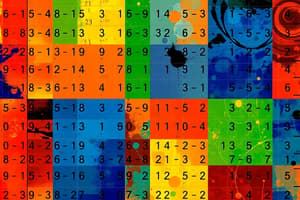Podcast
Questions and Answers
Which of the following is a valid operation that can be performed on matrices?
Which of the following is a valid operation that can be performed on matrices?
- Subtraction (correct)
- Integration
- Exponentiation
- Division
What is the defining property of a vector space?
What is the defining property of a vector space?
- Vectors can be represented by matrices.
- Vectors are arranged in rows and columns.
- Vectors can be added together and scaled by real numbers. (correct)
- Vectors must have both magnitude and direction.
Which of the following is true about eigenvectors?
Which of the following is true about eigenvectors?
- Eigenvectors are always orthogonal to each other.
- Eigenvectors are non-zero vectors that undergo a specific scalar change under a linear transformation. (correct)
- Eigenvectors are always parallel to the direction of the linear transformation.
- Eigenvectors are always zero vectors.
What is the relationship between eigenvalues and eigenvectors?
What is the relationship between eigenvalues and eigenvectors?
Which of the following is a key concept in understanding linear transformations?
Which of the following is a key concept in understanding linear transformations?
What is the purpose of studying linear algebra?
What is the purpose of studying linear algebra?
What do eigenvectors and eigenvalues help analyze in mechanical systems?
What do eigenvectors and eigenvalues help analyze in mechanical systems?
How are linear transformations represented?
How are linear transformations represented?
What is a determinant in linear algebra?
What is a determinant in linear algebra?
In linear transformations, what do matrices preserve?
In linear transformations, what do matrices preserve?
Why are eigenvectors and eigenvalues considered important in advanced mathematics and engineering?
Why are eigenvectors and eigenvalues considered important in advanced mathematics and engineering?
Flashcards are hidden until you start studying
Study Notes
Linear Algebra
Linear algebra is a branch of mathematics that focuses on linear equations, their representation in vector spaces, and matrices. It encompasses various subtopics such as matrix operations, vector spaces, eigenvalues and eigenvectors, linear transformations, and determinants. Let's explore these topics in detail.
Matrix Operations
Matrices are essential in linear algebra. They represent a collection of data arranged in rows and columns. Mathematical operations such as addition, subtraction, and multiplication can be performed on matrices. Addition involves adding corresponding elements of two matrices, while multiplication combines elements based on their respective positions in the matrices.
Vector Spaces
A vector space is a set of vectors that can be added together and scaled by multiplying with real numbers. Vectors are used to represent quantities with both magnitude and direction, such as displacement or velocity. The vector space consists of all possible combinations of these vectors, forming a mathematical framework for linear algebra.
Eigenvalues and Eigenvectors
Eigenvalues and eigenvectors are critical components in understanding linear transformations. An eigenvector is a non-zero vector that undergoes a specific scalar change when a linear transformation operator acts upon it. The scalar value is referred to as the eigenvalue. Eigenvectors and eigenvalues play a crucial role in analyzing stability, vibrations, and motion in mechanical systems.
Linear Transformations
Linear transformations involve the movement of points in a vector space without changing their shape or size. They preserve the operations of vector addition and scaling. Linear transformations are represented by matrices, where the coefficients correspond to the direction of the new position after the transformation.
Determinants
Determinants are special values assigned to square matrices. They encapsulate certain key properties of matrices and are essential in understanding higher-level concepts like inverses and eigenvalues. A determinant can be thought of as a measure of the volume scaling factor obtained when a matrix is transformed by its own inverse.
These topics are interconnected, and grasping the fundamentals of linear algebra is imperative for further study in advanced mathematics, computer science, physics, and engineering.
Studying That Suits You
Use AI to generate personalized quizzes and flashcards to suit your learning preferences.




